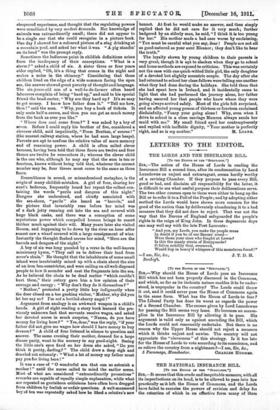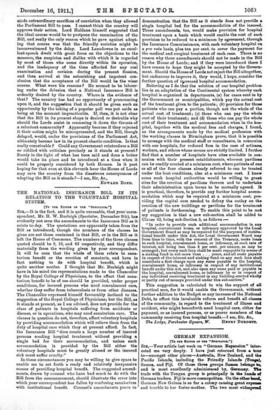THE NATIONAL INSURANCE BILL
[To THE EDITOR OP TEM "SrEcarore."]
SIR,—It seems that this crude and inequitable measure, with all its imperfections on its head, is to be allowed to pass into law practically as it left the House of Commons, and the Lords have failed to exercise the powers of revision and delay fox the retention of which in an effective form many of them
made extraordinary sacrifices of conviction when they allowed the Parliament Bill to pasts. I cannot think the country will approve their action. Lord Haldane himself suggested that the ideal course would be to postpone the examination of the Bill, and really the only reason which he gave against adopt- ing that course was that the friendly societies might be inconvenienced by the delay. Lord Lansdowne in an excel- lent speech dwelt with great force on the objections to the measure, the suspicion and dislike with which it is regarded by most of those who come directly within its operation, and the inadequacy of the time afforded for any real examination and revision during the present Session, and then arrived at the astonishing and impotent con- clusion that the acceptance of the Bill would be the wiser course. What were his reasons P He seemed to be labour- ing under the delusion that a National Insurance Bill is ardently desired by the country. Where is the evidence of that ? The country has had no opportunity of pronouncing upon it, and the suggestion that it should be given such an opportunity by the taking of a popular poll was put aside as being at the moment impracticable. If, then, it is not clear that the Bill in its present shape is desired or desirable why should the Lords assist in cramming it down the throats of a reluctant community? Apparently because if they rejected it their action might be misrepresented, and the Bill, though delayed, would, under the provisions of the Parliament Act, ultimately become law in its present chaotic condition. Is that really conceivable ? Could any Government reintroduce a Bill so riddled with criticism precisely as it stands at present ? Surely in the light of what has been said and done a better would take its place and be introduced at a time when it could be properly considered by both Houses. Is it past hoping for that even at this eleventh hour the House of Lords may save the country from the disastrous consequences of adopting the Bill as it stands ?—I am, Sir, &c.,
EDWARD BOND.



















































 Previous page
Previous page